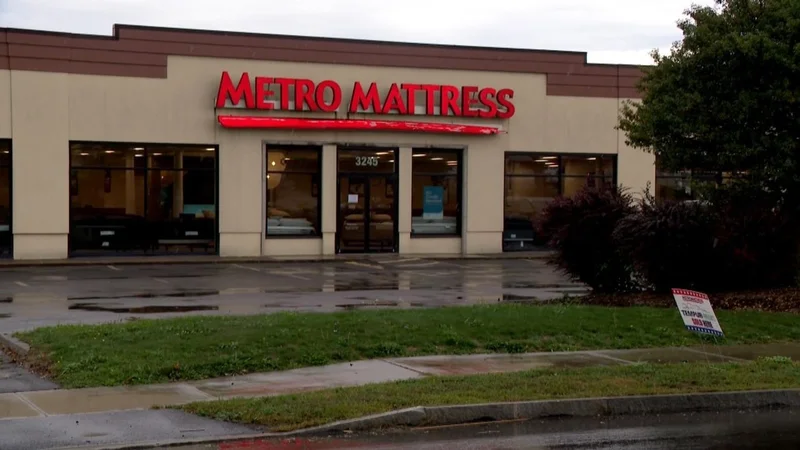So, Metro Mattress is finally dead. Let's not pretend to be shocked.
For 49 years, the Syracuse-based retailer managed to survive, and now it’s liquidating everything after a pathetic, year-long death rattle in bankruptcy court. The final nail in the coffin is the "Going Out of Business" sale, with giant, desperate signs screaming up to "70% OFF!" at its last five remaining stores. From 70 locations across the Northeast to a handful of retail tombstones in Syracuse, Rochester, and Albany.
It’s a classic story of retail failure. No, ‘classic’ is too kind—it's a textbook case of a company refusing to see the writing on the wall until the wall collapsed on top of it. They filed for Chapter 11 in September 2024, buried under $23.7 million in debt with less than $9 million in assets. You don't need an MBA to know that math doesn't work. That ain't a temporary cash flow problem; that's a gaping chest wound.
And now they're asking a judge for "permission" to close. Give me a break. That’s like asking for permission to pull the plug on a patient who’s been brain-dead for a year. The decision was made long before it hit any courtroom docket.
The Ghost of Retail Past
Let’s be brutally honest about what killed Metro Mattress. It wasn’t some unpredictable market shift or a sudden economic downturn. They were a Blockbuster Video store in a world that had already discovered Netflix. Their entire business model—giant showrooms with fluorescent lighting, pushy salespeople working on commission, and inflated prices to cover the insane overhead of brick-and-mortar rent—was a relic.
I once walked into one of their stores a few years back. The air was thick with that weird, plasticky new-mattress smell, and a salesman in a cheap suit materialized beside me before the door had even closed. It was an uncomfortable, high-pressure experience designed to make you spend too much money on something you couldn't really test until you got it home. Why would anyone choose that when you can order a Casper or a Purple online, have it show up in a box, and return it for free if you don't like it?
Metro Mattress is the perfect metaphor for a whole generation of businesses that thought their physical presence was a competitive advantage. It’s not. It’s an anchor. Their court filings read like a corporate eulogy. They tried to find a buyer, contacting 21 different companies. Twenty-one! Four of them even got into "serious discussions." Translation: four companies took a hard look at the books, saw the rot, and ran for the hills. What does it say about your company when 21 potential saviors look at you and say, "Nah, we're good"?

They owed Tempur-Pedic $2 million alone. When you can't even pay your biggest supplier, and you've got a business model from 1995, the end isn't a possibility; it's a certainty. It's a wonder they kept ther doors open this long.
So, Who Really Gets Screwed?
The press releases and news reports (like 'Metro Mattress to Close All Stores After Chapter 11 Bankruptcy') will talk about market forces and supply chain pressures. It’s all sanitized, corporate nonsense to mask a simple failure of leadership to adapt. But who pays the price for that failure?
First, the employees. People who showed up every day to sell mattresses are now out of a job, probably with little to no warning. They’re the ones left to slap the discount stickers on the remaining inventory and lock the doors for the last time.
Then there are the customers. Anyone holding a "10-Year Warranty" from Metro Mattress now owns a worthless piece of paper. Anyone with an outstanding order is probably in for a world of hurt trying to get their bed or their money back. You bought a promise from a company that was already insolvent, and now you're left holding the bag.
And finally, the communities. Another string of empty storefronts in already struggling strip malls across Upstate New York and New England. More blight. It’s a quiet, slow decay that hollows out local economies while online giants consolidate all the wealth and power.
But really, did management not see this coming? Were they truly blindsided by the rise of direct-to-consumer brands, or were they just hoping for a miracle while collecting their paychecks? We don't have the internal memos, offcourse, but you have to wonder at what point they knew it was over but kept the charade going. It’s the quiet part of every corporate collapse that never makes it into the official bankruptcy filings.
The Bed Was Already Made
Let's not mourn Metro Mattress. This wasn't a tragedy; it was an inevitability. This was a slow, predictable death brought on by a refusal to change with the times. They were selling an outdated experience at an uncompetitive price, and the market did what it's supposed to do: it put them out of their misery. The "Going Out of Business" sale is just the public funeral for a company that died years ago. They just forgot to tell anyone.
